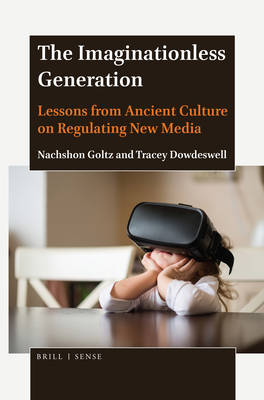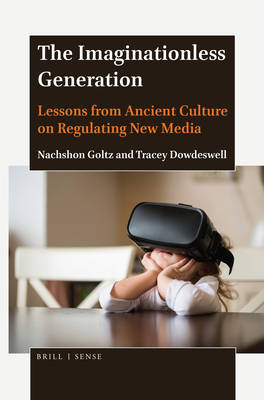
- Retrait gratuit dans votre magasin Club
- 7.000.000 titres dans notre catalogue
- Payer en toute sécurité
- Toujours un magasin près de chez vous
- Retrait gratuit dans votre magasin Club
- 7.000.0000 titres dans notre catalogue
- Payer en toute sécurité
- Toujours un magasin près de chez vous
The Imaginationless Generation
Lessons from Ancient Culture on Regulating New Media
Nachshon Goltz, Tracey Dowdeswell
Livre broché | Anglais
105,45 €
+ 210 points
Format
Description
In the present-day Tower of Babylon--the all-encompassing virtual world built of image layered upon image--children are the most vulnerable users. If we permit them unfettered access to media that promotes corporate and consumer values, while suppressing their cognitive development and creative imagination, then an 'imaginationless generation' may be our grim and inevitable future.
This book takes the reader, whether an academic, a parent or an educator, through a startling journey from the harms lurking in the virtual worlds--to children's health and well-being, to how they deal with representations of violence and sexuality, as well as exposure to cyberbullying, advertising, Internet Addiction Disorder, and even exploitation. The most dangerous harm is unseen, and affects the innermost realm of a child's psyche: the imagination. The authors discuss the current global regulatory framework that makes the protection of children ever more challenging. They discuss lessons learned from the ways that courts have negotiated free speech issues, as well as the research on parental mediation of children's Internet use in the home. Finally, they move towards a bold new attempt at understanding regulation, by drawing lessons for new media from ancient culture.
In The Imagionationless Generation, the authors pioneer an attempt to address the real harms that children face in virtual realities by presenting a new and paradigm shifting theory--the Media Engagement. They follow the theory's insights and predictions to offer a new perspective on a burning question of our time--how to protect children online. This multidisciplinary intellectual voyage and its insights are only possible by standing on the shoulders of scholars who have gone before, such as Ellul, Baudrillard, McLuhan, Postman and Piaget, to name a few.
As academics, parents and concerned human beings, the authors present here the results of more than twenty years of research in a way that should appeal to a wide variety of readers, as they stretch our understanding of the human-machine interface beyond right and wrong. This book shapes our understanding of media in the digital age in much the same way that McLuhan's Understanding Media did for a previous generation.
This book takes the reader, whether an academic, a parent or an educator, through a startling journey from the harms lurking in the virtual worlds--to children's health and well-being, to how they deal with representations of violence and sexuality, as well as exposure to cyberbullying, advertising, Internet Addiction Disorder, and even exploitation. The most dangerous harm is unseen, and affects the innermost realm of a child's psyche: the imagination. The authors discuss the current global regulatory framework that makes the protection of children ever more challenging. They discuss lessons learned from the ways that courts have negotiated free speech issues, as well as the research on parental mediation of children's Internet use in the home. Finally, they move towards a bold new attempt at understanding regulation, by drawing lessons for new media from ancient culture.
In The Imagionationless Generation, the authors pioneer an attempt to address the real harms that children face in virtual realities by presenting a new and paradigm shifting theory--the Media Engagement. They follow the theory's insights and predictions to offer a new perspective on a burning question of our time--how to protect children online. This multidisciplinary intellectual voyage and its insights are only possible by standing on the shoulders of scholars who have gone before, such as Ellul, Baudrillard, McLuhan, Postman and Piaget, to name a few.
As academics, parents and concerned human beings, the authors present here the results of more than twenty years of research in a way that should appeal to a wide variety of readers, as they stretch our understanding of the human-machine interface beyond right and wrong. This book shapes our understanding of media in the digital age in much the same way that McLuhan's Understanding Media did for a previous generation.
Spécifications
Parties prenantes
- Auteur(s) :
- Editeur:
Contenu
- Nombre de pages :
- 202
- Langue:
- Anglais
Caractéristiques
- EAN:
- 9789004398863
- Date de parution :
- 28-03-19
- Format:
- Livre broché
- Format numérique:
- Trade paperback (VS)
- Dimensions :
- 152 mm x 234 mm
- Poids :
- 294 g

Les avis
Nous publions uniquement les avis qui respectent les conditions requises. Consultez nos conditions pour les avis.






